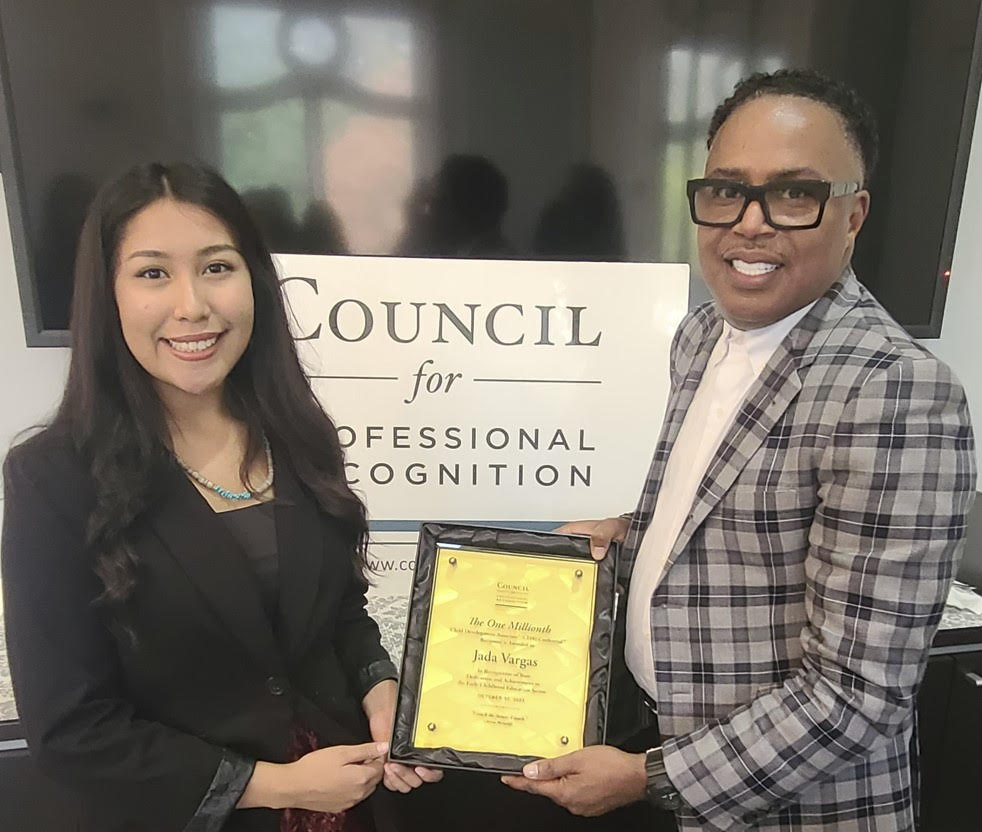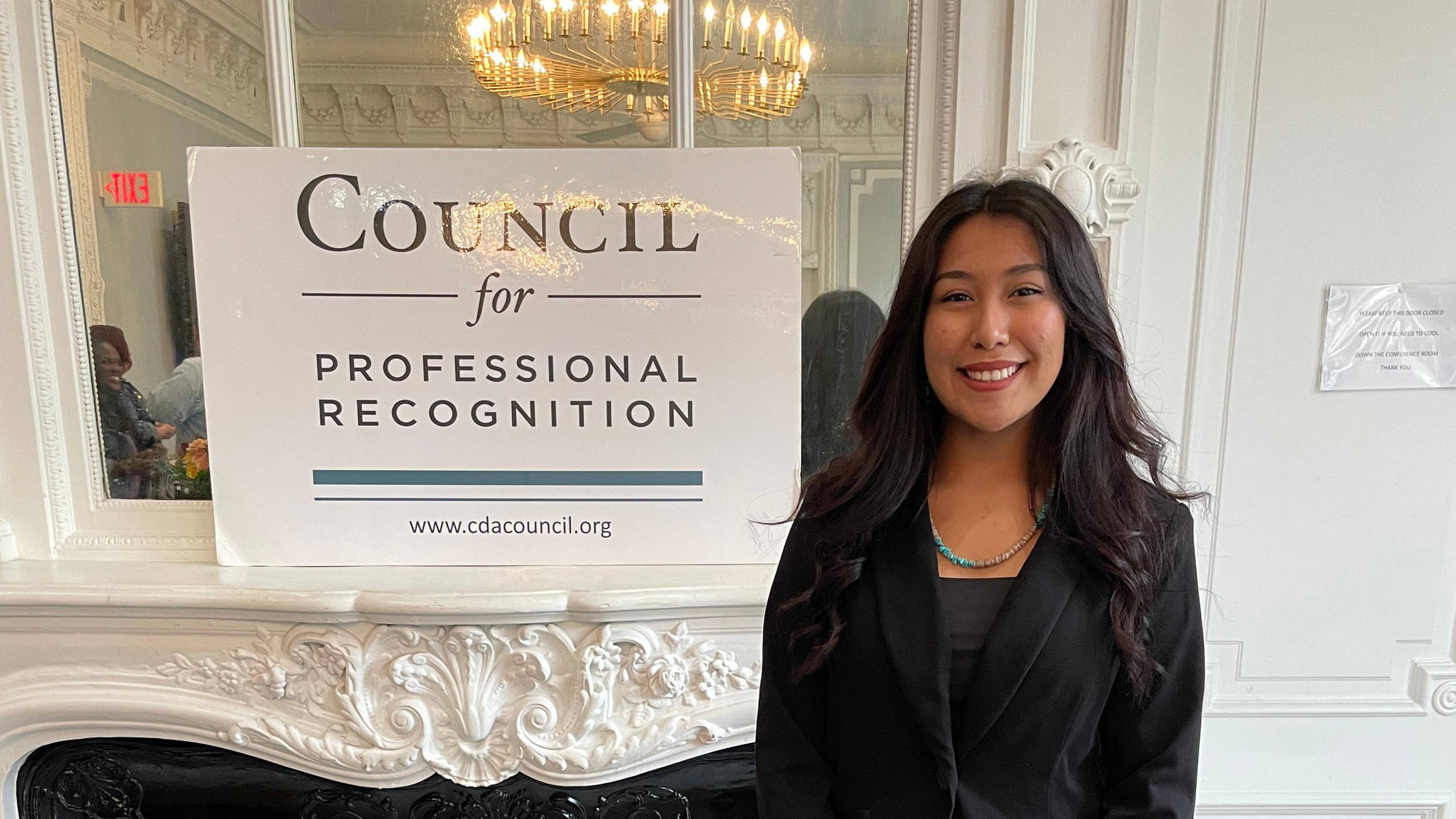When the Council for Professional Recognition issued its millionth Child Development Associate (CDA) credential in September 2023, it was cause for celebration. Jada Vargas, an 18-year-old from Arizona and a member of the Apache Tribe, received the millionth credential. Vargas had graduated from Theodore Roosevelt High School last May.
The CDA requires significant coursework and teaching. Vargas had to gain 480 hours of experience in the classroom, besides taking 120 hours of coursework either in person or online. She admits that it was a lot of work, but says “It’s so worth it. Earning my CDA taught me new and different ways to work effectively in the classroom, so I continued pushing myself each day.” Like many CDA holders who use the certification as a steppingstone to further career development, Vargas plans to pursue a degree in early childhood education.
Dr. Calvin E. Moore, Jr., CEO of the Council, says, “CDA holders know the demands of a real-world classroom and increasingly have what it takes to meet them. I’m gratified that the number of CDA earners between 18 and 34 has been increasing.”

The CDA Credential dates back to the start of Head Start—part of President Lyndon B. Johnson’s War on Poverty—when the supply of educators fell far short of the demand in the communities the program was meant to serve. In 1971, at the annual meeting of the told the National Association for the Education of Young Children, Edward R. Zigler, director of the U.S. Office of Child Development, declared,
“We must develop a middle-level profession to care for our country’s children. The need for the Child Development Associate, an individual who has not had as much scholastic training as those with college degrees, but nevertheless has the competencies to care independently for children, is central to a major issue in child care. Are we going to provide the children of this nation with developmental child care or are we going to provide them merely with babysitting?”
👉A Brief History and Overview of the Head Start Program (First Five Years Fund)
Before the Council took the helm in 1985, Bank Street College in New York City administered the CDA. “Providing child care is a profession,” said Ellen Galinsky, who taught at Bank Street for 25 years and went on to found Mind in the Making. “Child care,” she added, “is a profession that requires a solid background in such fundamentals of child development as knowing what curriculum is appropriate to a particular age group, the basics of health and safety, and how to form effective partnerships with parents.”
Nearly 5,500 members of the CDA community have lent their voices and views to a survey on ways to bring more equity, ease and access to the CDA process. Nearly 90% of CDA holders report feeling more prepared for the classroom because they’ve gained a foundation in early learning and best practices for the profession. “The CDA was a wonderful way to get into my current position,” one teacher said, “and get into the job market I wanted to be in.”
Another respondent observed, “CDA holders appear to be better at interacting with children and communicating with parents. They also stay on the job longer and seem more committed to their work.”
According to Dr. Moore, remote learning is on the rise. He also sees increased recognition of the value of diversity, equity and inclusion in the workplace, with an emphasis on advancing communities that are underserved. “That is the Council’s central mission,” he says. “We have always been committed to ensuring equity for all children and for the teachers who provide them with the quality learning they need.”
👉Using Design Thinking to Reimagine the Child Development Associate Credential
Ten U.S. territories and states that have embedded the CDA in their child care licensure and career ladder for professionals in the early learning field: Puerto Rico, Oklahoma, Louisiana, Arkansas, Alaska, Wyoming, Ohio, Michigan, Florida and Washington, D.C. Florida requires every child care center to have at least one staff member with a CDA. In the District, a 2016 law mandates that all assistant teachers must have a CDA.
Scholarships and support are making it easier for teachers to earn the CDA. For example, the Council and the Maryland State Department of Education are now partnering to provide thousands of the state’s early childhood teachers with financial support to help them earn or renew their CDA. These financial awards cover application and other fees, as well as books required for the program, and the state considers this a wise investment in the future.
The Maryland-Council partnership is also promoting the high school CDA, incentivizing teens to imagine a productive future at a time when they’re searching for a path from high school to careers. The CDA helps them take their first steps into the early learning field because it “provides you with knowledge if you have no knowledge of child care,” as one novice teacher said in the Council’s recent survey.
College may not be the next step for everyone with a high school diploma. Exorbitant tuition and other factors are encouraging more high school graduates to explore nondegree pathways. Health care is better known as a career option for those without a college education, but child care is a worthy and essential field, especially if the passion for building brains in young children is there.
Asked what advice she would give to a high school student contemplating the rigorous CDA process, Vargas said. “If you keep going forward, you will see the benefit of the journey.”
“High schoolers who earn a CDA,” Dr. Moore said, “give us high hopes for the future of our field.”

Mark Swartz
Mark Swartz writes about efforts to improve early care and education as well as developments in the U.S. care economy. He lives in Maryland.



